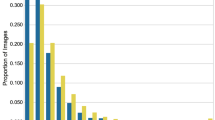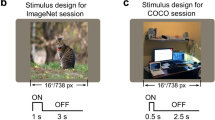Abstract
Visual analysis of complex real-world scenes (e.g. overhead imagery) is a skill essential to many professional domains. However, little is currently known about how this skill is formed and develops with experience. The present work adopts a neuroergonomic approach to uncover the underlying mechanisms associated with the acquisition of scene expertise, and establish neurobehavioral markers for the effectiveness of training in scene imagery analysis. We conducted an intensive six-session behavioral training study combined with multiple functional MRI scans using a large set of high-resolution color images of real-world scenes varying in their viewpoint (aerial/terrestrial) and naturalness (manmade/natural). Participants were trained to categorize the scenes at a specific-subordinate level (e.g. suspension bridge). Participants categorized the same stimuli for five sessions; the sixth session consisted of a novel set of scenes. Following training, participants categorized the scenes faster and more accurately, reflecting memory-based improvement. Learning also generalized to novel scene images, demonstrating learning transfer, a hallmark of perceptual expertise. Critically, brain activity in scene-selective cortex across all sessions significantly correlated with learning transfer effects. Moreover, baseline activity (pre-training) was highly predictive of subsequent perceptual performance. Whole-brain activity following training indicated changes to scene- and object-selective cortex, as well as posterior-parietal cortex, suggesting potential involvement of top-down visuospatial-attentional networks. We conclude that scene-selective activity can be used to predict enhancement in perceptual performance following training in scene categorization and ultimately be used to reveal the point when trainees transition to an expert-user level, reducing costs and enhancing existing training paradigms.
Access this chapter
Tax calculation will be finalised at checkout
Purchases are for personal use only
Similar content being viewed by others
References
Cheng, G., Han, J., Lu, X.: Remote sensing image scene classification: benchmark and state of the art. Proc. IEEE 105(10), 1865–1883 (2017)
Malcolm, G.L., Groen, I.I., Baker, C.I.: Making sense of real-world scenes. Trends Cogn. Sci. 20(11), 843–856 (2016)
Drew, T., Evans, K., Võ, M.L.H., Jacobson, F.L., Wolfe, J.M.: Informatics in radiology: what can you see in a single glance and how might this guide visual search in medical images? Radiographics 33(1), 263–274 (2013)
Harel, A., Kravitz, D., Baker, C.I.: Beyond perceptual expertise: revisiting the neural substrates of expert object recognition. Front. Hum. Neurosci. 7, 885 (2013)
Sestito, M., Flach, J., Harel, A.: Grasping the world from a cockpit: perspectives on embodied neural mechanisms underlying human performance and ergonomics in aviation context. Theor. Issues Ergon. Sci. 19(6), 692–711 (2018)
Sestito, M., Harel, A., Nador, J., Flach, J.: Investigating neural sensorimotor mechanisms underlying flight expertise in pilots: preliminary data from an EEG study. Front. Hum. Neurosci. 12, 489 (2018)
Tracey, I., Flower, R.: The warrior in the machine: neuroscience goes to war. Nat. Rev. Neurosci. 15(12), 825–834 (2014)
Ringer, R.V., Loschky, L.C.: Head in the clouds, feet on the ground: applying our terrestrial minds to satellite perspectives. In: Remote Sensing and Cognition. pp. 77–100. CRC Press (2018)
Loschky, L.C., Ringer, R.V., Ellis, K., Hansen, B.C.: Comparing rapid scene categorization of aerial and terrestrial views: a new perspective on scene gist. J. Vis. 15(6), 11 (2015)
Lloyd, R., Hodgson, M.E., Stokes, A.: Visual categorization with aerial photographs. Ann. Assoc. Am. Geogr. 92(2), 241–266 (2002)
Šikl, R., Svatoňová, H., Děchtěrenko, F., Urbánek, T.: Visual recognition memory for scenes in aerial photographs: exploring the role of expertise. Acta Psychologica 197, 23–31 (2019)
Shelton, A.L., Gabrieli, J.D.E.: Neural correlates of encoding space from route and survey perspectives. J. Neurosci. 22, 2711–2717 (2002)
Barra, J., Laou, L., Poline, J.B., Lebihan, D., Berthoz, A.: Does an oblique/slanted perspective during virtual navigation engage both egocentric and allocentric brain strategies? PLoS One 7(11), e49537 (2012)
Epstein, R., Kanwisher, N.: A cortical representation of the local visual environment. Nature 392(6676), 598–601 (1998)
Dilks, D.D., Julian, J.B., Paunov, A.M., Kanwisher, N.: The occipital place area is causally and selectively involved in scene perception. J. Neurosci. 33(4), 1331–1336 (2013)
Silson, E.H., Steel, A.D., Baker, C.I.: Scene-selectivity and retinotopy in medial parietal cortex. Front. Hum. Neurosci. 10, 412 (2016)
Epstein, R.A., Baker, C.I.: Scene perception in the human brain. Ann. Rev. Vis. Sci. 5(1), 373–397 (2019)
Harel, A.: What is special about expertise? Visual expertise reveals the interactive nature of real-world object recognition. Neuropsychologia 83, 88–99 (2016)
Harel, A., Gilaie-Dotan, S., Malach, R., Bentin, S.: Top-down engagement modulates the neural expressions of visual expertise. Cereb. Cortex 20(10), 2304–2318 (2010)
Harel, A., Ullman, S., Harari, D., Bentin, S.: Basic-level categorization of intermediate complexity fragments reveals top-down effects of expertise in visual perception. J. Vis. 11(8), 1–13 (2011)
Bruyer, R., Brysbaert, M.: Combining speed and accuracy in cognitive psychology: is the inverse efficiency score (IES) a better dependent variable than the mean reaction time (RT) and the percentage of errors (PE)? Psychologica Belgica 51(1), 5–13 (2011)
Gopher, D., Well, M., Bareket, T.: Transfer of skill from a computer game trainer to flight. Hum. Factors 36(3), 387–405 (1994)
Tanaka, J.W., Curran, T., Sheinberg, D.L.: The training and transfer of real-world perceptual expertise. Psychol. Sci. 16(2), 145–151 (2005)
Kim, J., Zeng, H., Ghadiyaram, D., Lee, S., Zhang, L., Bovik, A.C.: Deep convolutional neural models for picture-quality prediction: challenges and solutions to data-driven image quality assessment. IEEE Signal Process. Mag. 34(6), 130–141 (2017)
Ericsson, K.A., Kintsch, W.: Long-term working memory. Psychol. Rev. 102(2), 211–245 (1995)
Hansen, N.E., Noesen, B.T., Nador, J.D., Harel, A.: The influence of behavioral relevance on the processing of global scene properties: an ERP study. Neuropsychologia 114, 168–180 (2018)
Gauthier, I.: Domain-specific and domain-general individual differences in visual object recognition. Curr. Dir. Psychol. Sci. 27(2), 97–102 (2018)
Harley, E.M., et al.: Engagement of fusiform cortex and disengagement of lateral occipital cortex in the acquisition of radiological expertise. Cereb. Cortex 19(11), 2746–2754 (2009)
Author information
Authors and Affiliations
Corresponding author
Editor information
Editors and Affiliations
Rights and permissions
Copyright information
© 2020 Springer Nature Switzerland AG
About this paper
Cite this paper
Borders, J.D., Dennis, B., Noesen, B., Harel, A. (2020). Using fMRI to Predict Training Effectiveness in Visual Scene Analysis. In: Schmorrow, D., Fidopiastis, C. (eds) Augmented Cognition. Human Cognition and Behavior. HCII 2020. Lecture Notes in Computer Science(), vol 12197. Springer, Cham. https://doi.org/10.1007/978-3-030-50439-7_2
Download citation
DOI: https://doi.org/10.1007/978-3-030-50439-7_2
Published:
Publisher Name: Springer, Cham
Print ISBN: 978-3-030-50438-0
Online ISBN: 978-3-030-50439-7
eBook Packages: Computer ScienceComputer Science (R0)




